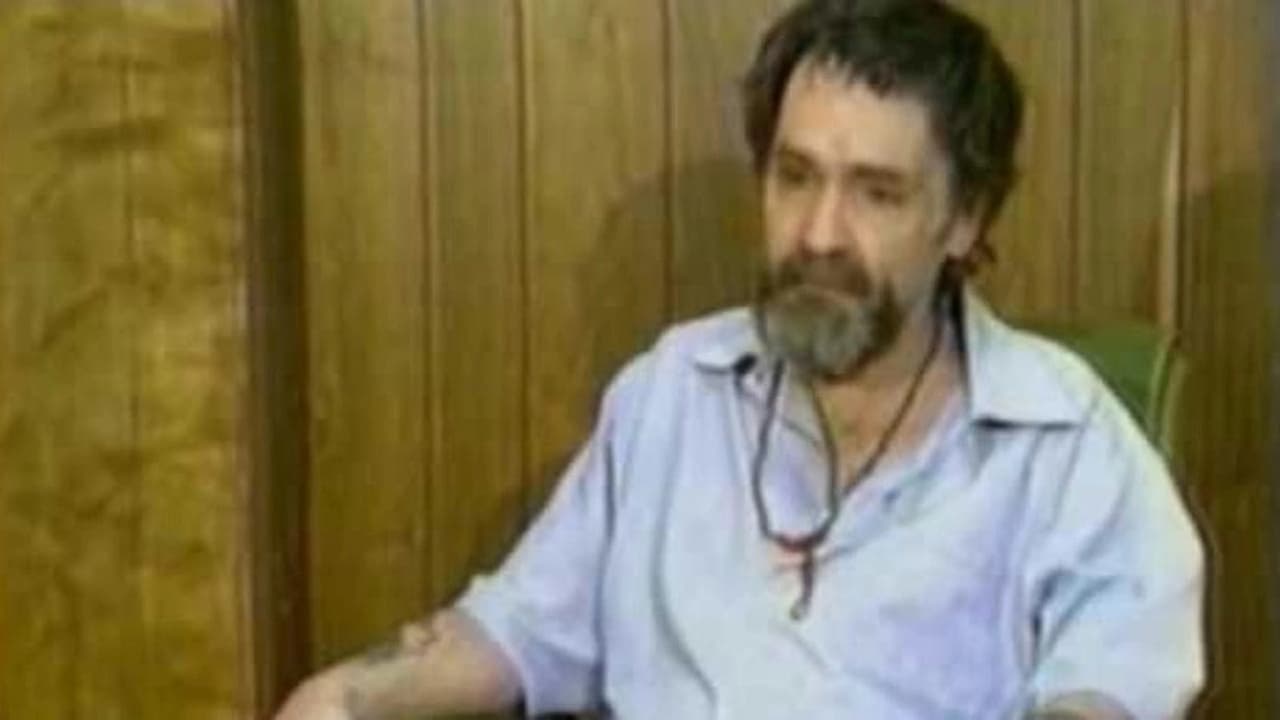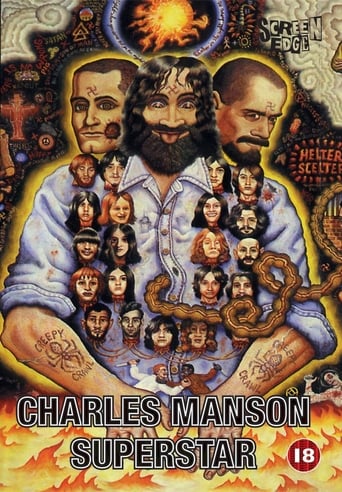



Wonderful character development!
Plot so thin, it passes unnoticed.
I am only giving this movie a 1 for the great cast, though I can't imagine what any of them were thinking. This movie was horrible
View MoreIt's funny, it's tense, it features two great performances from two actors and the director expertly creates a web of odd tension where you actually don't know what is happening for the majority of the run time.
View MoreOver the last few decades, all but the faintest trace remains of the potently symbolic light in which Charles Manson, his Family, and the murders that brought him notoriety were originally seen. While now sanitised by parody, media-overexposure, and age, it takes some feat to imagine the supernaturally charismatic anti-messiah and serious-threat-to-the-foundations-of-society he was once portrayed as. Yet it is this image which 'Charles Manson Superstar' evokes and explores in a way which begins by mixing erudite objectivity and reasoned (but slightly unnerving-in-its-implications) apologism with the kind of all out glorification writer/director Nikolas Schreck has made no bones about in the past. Indeed, one time associate of the Church of Satan and founder of spin-off, eugenics-endorsing, organisation the Order of the Werewolf, Schreck and partner Zeena (daughter of Anton) LaVey were the driving force behind the 8/8/88 Satanic rally, held on the anniversary of the Tate murders to commemorate the "cleansing" they represented. What's more, during the rally, a movie ('The Other Side of Madness') was shown which depicts the murders in grisly detail and drew cheers from the crowd when the slaying began.Morally dubious this may well all be, but 'Charles Manson Superstar' is nonetheless a highly rewarding documentary. This is due to the fact that the all-out Manson sympathy agenda only emerges on a few occasions and yet somehow the fearlessness needed to admit this perspective (so readily dismissed as misguided or otherwise condemned as degenerate) has a curiously liberating effect on the remaining parts of the documentary which objectively contextualise the man and the crimes as well as broach the difficulty/futility of attempting to penetrate the body of sensationalist media myths and social paranoia that plagues discussion of the topic. Furthermore, the line separating glorification/objectivity is blurred by the extended interview footage with Manson himself which between some silly karate moves, word-salad, and uber-60s style opining on "the music you dig?" permits him space to elaborate on the role of the Gnostic God Abraxas, the ecological movement (ATWA) which he founded, and offer penetrating criticisms of the incestuous relationship between the media and society and the parasitic relationship both have to crime and criminals. All of which really does offer glimpses of an attractive anti-establishment philosophy synthesised by a keen mind which could easily offer solace to society's disaffected and certainly shows Manson as far more intelligent than the one-dimensional malevolent-hippie-lunatic he is uniformly presented as.Having read several reviews over several sites, much seems to have been made of the supposed "numerous" factual inaccuracies which "litter" the film. However, most reviews I have read stop short of actually listing them. As far as I can gather, this is an exaggeration: a few inaccuracies there are, but these include the birthday of Ed Gein and the fact the documentary claims Lennon wrote the song 'Helter Skelter' when we all know it was McCartney. Hardly condemning stuff, and it seems that focusing on these kind of trivialities is designed to detract attention away from the more penetrating and thought provoking aspects of the documentary. However, having said this, there is one inaccuracy of note: the film advocates the apologist argument that Manson's incarceration is due to his anti-establishment ideas and that he was not responsible for the murders nor even present at the scenes of the crime. While there is an argument that Manson's continued incarceration is an unjust political move designed to avoid the uproar that would accompany it, the role of wholly innocent sacrificial lamb really doesn't suit him and it is generally acknowledged that while he never actually slayed anyone, he was present at the scene (albeit in a casing capacity) and it was the acid soaked apocalyptic milieu he crafted that was certainly a fundamental aspect of the atrocities.This point duly noted, in my opinion the wealth of information and the wholly original perspective the documentary offers makes its limitations forgivable and even though the caveats are that Schreck's agenda should be known and it should be watched alongside other documentaries as a point of comparison, 'Charles Manson Superstar' is nonetheless a fascinating watch and has much to offer even the most knowledgeable followers of the pop-culture phenomenon that ended the Sixties.
View MoreAs one long fascinated by the Manson story, watching this documentary movie was a mostly disappointing exercise. The slightly somnambulistic narrative is based on some painfully dodgy research (for example, a woman who is most definitely not Manson's mother is shown, despite what the soundtrack implies), and an equally unfortunate tendency to get rather 'cosmic', in the sense of trying to create an air of malevolent apocalyptic convergence and doom. To this end we learn from the opening preamble that 'the time-grid we know as August 8th to 9th has always been a magnet for events of savage purification'. The narrator lists the bombing of Nagasaki and the inaugural meeting of the KKK, but suddenly runs out of legitimate examples and offers such desperate toe-curling makeweights as the birth dates of Ed Gein and Unity Mitford, and the 1985 LAPD announcement of their pursuit of the Night Stalker serial killer. Thus he proves that the time-grid we know as August 8th to 9th hasn't been a magnet for events of savage purification at all. On a positive note, it is good to see the actual geographical areas in which the original events took place. Thanks to the makers for driving around the LA hills with the camera out of the window. Anyway, we're here for more than just some ultra-cheapo graphics and a stoned-sounding narrator reading out a b minus high school essay, because a large percentage of 'Charles Manson Superstar' is taken up with exclusive prison interview footage with the man himself. Don't get too excited, though. Speaking entirely in vague generalities, Manson has only one thing to say and that is 'I'm an old man. I don't want to talk about my crimes and I don't need the world's attention on me, so I'm acting the crazy-man so that you'll just go away and leave me alone.' Over the decades many a journalist has taken the pilgrimage to go poke Manson and see if he bites, and all they get is the same 'crazy Charlie' show. Ask him something specific and at best he replies with a foggy metaphor. At worst he just starts into one of his elaborately pointless rants and ends up moving the viewer to tedium. True, there are moments when one can discern the sort of sinister persuasiveness, charisma and even the fatal personal charm which could conceivably convince a group of damaged and drug-messed followers to commit bloody murder, but he's on screen far too often blathering away unchecked and the forced familiarity soon breeds contempt and eventual disinterest. Which, one is tempted to believe, is exactly what Charles Manson desires.
View MoreThere are many films explicitly about Manson, and even more loosely inspired by him and the deeds attributed to him & 'The Family.' Most of them are worthless except as pure exploitation. This is the only one that provides more than a snippet of actual interview footage with the man himself. It is primarily for this reason that I strongly recommend it. If you have any curiosity, or interest in Manson, whether you despise or admire this legendary American outlaw, you'll want to see "Charles Manson, Superstar" to augment your perception of him. Be advised that the makers of this film are evidently Neo-Nazis, and their biased approach is about as subtle as a brick dropping on your head. Even if Manson was/is a Nazi, I think such indulgences as the interview with James Mason, American Neo-Nazi, detract from rather than add to the film. On the plus side, George Stimson was a consultant on this film, and he was a confidante to CM, and onetime webmaster of the "official" Manson website. Of all the films about Manson, this one, however amateurish, patronizing and biased, is the most legitimate, if only in the sense that it allows Charles Manson to speak for himself.Other films of note on the subject are "Manson" [1972] and "The Helter Skelter Murders" aka "The Other Side Of Madness" [1970].
View MoreThe film itself is interesting to see because it's a great example of a documentary that gets across the exact opposite message of what the filmmaker intended (Triumph Of The Will is another). The basic film goes between two types of footage. One is made up of still photos and stock footage (sometimes "enhanced" by lame psychedelic effects) with narration. The narration, read in monotone, sounds about like what you might expect a pseudo-rebel middle school student to post in a Manson chat room - It's Manson's familiar history told with glowing admiration and peppered with phrases like "Manson only reflects the society that imprisoned him" and references to "the conditioned masses" that consider Manson to be the half witted turd that he is. The narration criticizes Manson's victims and his keepers, while praising Manson. The filmmaker, Nikolas Schreck, also managed to score a lengthy prison interview with Manson. The interview delves only slightly into what Manson is infamous for (the pointless, envious, brutal murders of his racist hate cult), and instead centers on Manson's "philosophy". Manson's philosophy, as anyone who has seen him interviewed knows, is basically that everyone is phony and screwed up except him. He really says nothing else in the interview, and whenever he reaches a point in his monologue where he might otherwise say something informative, he instead makes a contorted face and giggles or does some kind of karate dragon dance. He is un-chained and un-handcuffed in the interview and is free to walk around the room. Whenever the filmmaker asks a difficult question (though, not much more difficult then "say something to the camera that you have always wanted to tell people"), Manson masterfully intimidates him off the topic by standing and approaching him or touching him, at one point taking one of his hands and caressing it for several seconds. The entire thing is scored by bootleg recordings of Manson's tortuously bad music.
View More